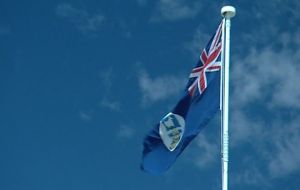MercoPress. South Atlantic News Agency
Uruguay Navy says there is no legal impediment for Falklands’ flagged vessels to operate in Montevideo
 Changing the Falklands for the English flag “is the same”
Changing the Falklands for the English flag “is the same” A report from the Uruguayan Coast Guard argues there is no legislation impeding Falklands/Malvinas flagged vessels from operating in the port of Montevideo. The report was handed to the Uruguayan Ministry of Foreign Affairs which is drafting a protocol regarding what ships can and which can’t access Uruguayan ports.
The Foreign Affairs ministry protocol follows Uruguayan President Jose Mujica decision to bar Falkland/Malvinas vessels from calling or operating in Uruguayan ports, a position which was made extensive to all Mercosur members (Argentina, Brazil, Paraguay and Uruguay) during the two-day group’s summit earlier this week in Montevideo.
The Coast Guard report released Thursday and elaborated by its legal department, states that there is no maritime legislation preventing vessels flying the Falklands/Malvinas flag from operating in Uruguayan ports.
The report indicates that the UK grants some of its territories the possibility of flying their own flag, and therefore Falklands/Malvinas flagged vessels have a “subsidiary” permit from the UK and any action involving these vessels is “relayed to British diplomacy”.
“If they change the Falklands for the English flag it’s the same” said an officer from the Uruguayan Navy legal department. He added that officially there is no written instruction on the issue from the Executive, although it was verbally communicated to the Ports Authority (ANP).
The Maritime Navigation Centre which brings together all Uruguayan companies involved in the service industry for all-flag fishing vessels operating in Montevideo requested an interview with the Uruguayan Foreign Affairs ministry but they were told to refer to the “maritime authority” which is responsible for applying the measure decided by the Uruguayan Executive.
The Uruguayan Ports Authority, ANP, has a list of 34 Falklands/Malvinas flagged vessels, and an estimated 15 of them use the port of Montevideo and others have been operating from south Brazil ports.
The Mercosur summit in a two paragraph statement said that “the commitment timely assumed (by member countries) to adopt, in conformity with International Law and the respective legislations of each member country, all measures susceptible of being regulated to impede the access to its ports of vessels flying the illegal flag of the Malvinas Islands”.
The first British reaction came from Foreign Office Minister Jeremy Browne who expressed “concern” about the decision recalling that “Falklands-flagged vessels have been regular visitors to South American ports for 150 years”.
He added “it is unacceptable to engage in an economic blockade of the Falklands. Mercosur should take the responsible decision and not do this. There can be no justification – legal, moral or political – for efforts to intimidate the people of the Falkland Islands”.
However “no one should be in any doubt about the British Government’s commitment to support the Falkland Islanders’ right to determine their own political future” said Browne.




Top Comments
Disclaimer & comment rules-

-

-

Read all commentsthis is getting juicier than I thought, let's see what happens next :P
Dec 22nd, 2011 - 09:34 pm 0“If they change the Falklands for the English flag it’s the same(sh..)” said an officer from the Uruguayan Navy legal department.
Dec 22nd, 2011 - 09:43 pm 0“No one should be in any doubt about the British Government's commitment to support the Falkland Islanders right to determine their own political Future”.
Dec 22nd, 2011 - 09:56 pm 0Says it all really!!!
Long Live the Falklands.
Commenting for this story is now closed.
If you have a Facebook account, become a fan and comment on our Facebook Page!